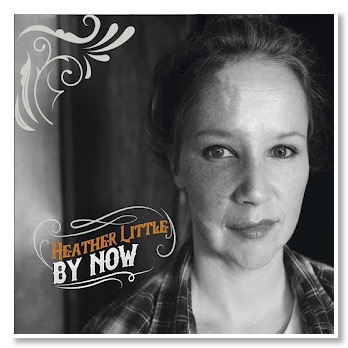May 2024
A State of Grace

Jupiter Index: The songs on your new release By Now all have complex melodies and vocals such as “Transistor Radio” and “Better By Now.” Can you talk about those tracks and what it was like working with producer Brian Brinkeroff?
Heather Little: Those are two pretty contrasting songs. Brian and I didn’t discuss in detail things like changes in time signature or dynamics, but he tuned into EXACTLY what I meant, just from the skeletal guitar-vocal recordings we made. I had always been apprehensive about ever trying to record Transistor Radio because I can hear what I want in my head, but cannot play any of the other parts I’d imagined. He knew exactly where I was going and beat me there. With Better By Now, and a lot of the others, they began sparse, and the instrumentation grew one instrument at a time. Every musician was hand-picked by Brian with so much care and attention to detail. That in itself gave each song its own personality. There aren’t two alike in the whole lot, and still they flow together like they were born on this record. They were definitely reborn.
JI: The songs on your new release By Now all have complex melodies and vocals such as “Transistor Radio” and “Better By Now.” Can you talk about those tracks and what it was like working with producer Brian Brinkeroff?
HL: Those are two pretty contrasting songs. Brian and I didn’t discuss in detail things like changes in time signature or dynamics, but he tuned into EXACTLY what I meant, just from the skeletal guitar-vocal recordings we made. I had always been apprehensive about ever trying to record Transistor Radio because I can hear what I want in my head, but cannot play any of the other parts I’d imagined. He knew exactly where I was going and beat me there. With Better By Now, and a lot of the others, they began sparse, and the instrumentation grew one instrument at a time. Every musician was hand-picked by Brian with so much care and attention to detail. That in itself gave each song its own personality. There aren’t two alike in the whole lot, and still they flow together like they were born on this record. They were definitely reborn.
JI: It seems the record may be memorable for you on many levels. Do you have a certain way of writing your songs?
HL: Usually, what sparks a new song is a specific word or phrase. And these almost always appear in some strong emotional time, or transitional period. Sometimes they sit there in that raw state for months or years before they’re ready to find their way home.
JI: Can you share your insight and experience working with Patty Griffin on “This Life Without You”?
HL: Well, I have yet to have the pleasure of meeting Patty Griffin. Her appearance on this record is a gift from the heavens as far as I’m concerned. I have loved her voice and her writing for so long, I don’t even know who I would be as a singer songwriter had my brother not shown me her music decades ago. It was the sorcery of Brian Brinkerhoff and Frank Swart that made her appearance on this record a reality for me. I will be grateful my whole life to them, and to Patty for lending her magic to this song that is so close to my heart.
JI: Do you think that personal songs are more powerful than politically motivated songs?
HL: I think it depends on the listener. A person who’s very politically motivated or delves deeply into politics in daily life will be more attuned to political subject matter, and within that frame, could be drawn closer, or alienated, depending on whether the song suits a certain political agenda. By the same token, a person’s politics can make a political song personal, or a personal song political. I’m a humanist when it comes down to it, so if a song of mine feels political, be assured it’s based in my feelings and experiences with no regard to my or anyone else’s politics.
JI: At this time, what are your three best memories in music?
HL: My mother singing to me. Singing harmony with my brother. Watching my children fall in love with music.
JI: Would you like to add anything else about your music and would like people to know?
HL: I am just grateful for listeners who care about these songs. I hope people hear them and feel less alone in their lives and struggles.
by G.M. Burns


